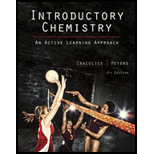
A monoatomic ion with a charge of
(a)
Interpretation:
Whether the monoatomic ion with a charge of
Concept introduction:
The arrangement of electrons in the energy sublevels is explained by the electron configuration of an atom. The electron configuration of an atom can be written according to the arrangement of energy levels as shown below.
In the modern periodic table, the horizontal rows are known as periods, whereas vertical columns are known as groups. There are
Answer to Problem 2E
The monoatomic ion with a charge of
Explanation of Solution
The monoatomic ion with a charge of
The monoatomic ion with a charge of
(b)
Interpretation:
The noble gas with which the monoatomic ion is isolectronic is to be stated.
Concept introduction:
The arrangement of electrons in the energy sublevels is explained by the electron configuration of an atom. The electron configuration of an atom can be written according to the arrangement of energy levels as shown below.
In the modern periodic table, the horizontal rows are known as periods, whereas vertical columns are known as groups. There are
Answer to Problem 2E
The noble gas with which the monoatomic ion is isolectronic is argon,
Explanation of Solution
The electronic configuration of
The electronic configuration of
The electronic configuration of
The noble gas with which the monoatomic ion is isolectronic is argon,
(c)
Interpretation:
The symbol of the ion is to be stated.
Concept introduction:
The arrangement of electrons in the energy sublevels is explained by the electron configuration of an atom. The electron configuration of an atom can be written according to the arrangement of energy levels as shown below.
In the modern periodic table, the horizontal rows are known as periods, whereas vertical columns are known as groups. There are
Answer to Problem 2E
The symbol of the ion is
Explanation of Solution
Chlorine belongs to the halogen group. The atomic number of
The symbol of the ion is
Want to see more full solutions like this?
Chapter 12 Solutions
Introductory Chemistry: An Active Learning Approach
- ASP please....arrow_forwardNonearrow_forwardConsider the structure of 1-bromo-2-fluoroethane. Part 1 of 2 Draw the Newman projection for the anti conformation of 1-bromo-2-fluoroethane, viewed down the C1-C2 bond. ✡ ぬ Part 2 of 2 H H F Br H H ☑ Draw the Newman projection for the gauche conformation of 1-bromo-2-fluoroethane, viewed down the C1-C2 bond. H F Br H Harrow_forward
- Please help me answer this question. I don't understand how or where the different reagents will attach and it's mostly due to the wedge bond because I haven't seen a problem like this before. Please provide a detailed explanation and a drawing showing how it can happen and what the final product will look like.arrow_forwardWhich of the following compounds is the most acidic in the gas phase? Group of answer choices H2O SiH4 HBr H2Sarrow_forwardWhich of the following is the most acidic transition metal cation? Group of answer choices Fe3+ Sc3+ Mn4+ Zn2+arrow_forward
- Based on the thermodynamics of acetic acid dissociation discussed in Lecture 2-5, what can you conclude about the standard enthalpy change (ΔHo) of acid dissociation for HCl? Group of answer choices You cannot arrive at any of the other three conclusions It is a positive value It is more negative than −0.4 kJ/mol It equals −0.4 kJ/molarrow_forwardPLEASE HELP URGENT!arrow_forwardDraw the skeletal structure corresponding to the following IUPAC name: 7-isopropyl-3-methyldecanearrow_forward
 Introduction to General, Organic and BiochemistryChemistryISBN:9781285869759Author:Frederick A. Bettelheim, William H. Brown, Mary K. Campbell, Shawn O. Farrell, Omar TorresPublisher:Cengage Learning
Introduction to General, Organic and BiochemistryChemistryISBN:9781285869759Author:Frederick A. Bettelheim, William H. Brown, Mary K. Campbell, Shawn O. Farrell, Omar TorresPublisher:Cengage Learning Principles of Modern ChemistryChemistryISBN:9781305079113Author:David W. Oxtoby, H. Pat Gillis, Laurie J. ButlerPublisher:Cengage Learning
Principles of Modern ChemistryChemistryISBN:9781305079113Author:David W. Oxtoby, H. Pat Gillis, Laurie J. ButlerPublisher:Cengage Learning General, Organic, and Biological ChemistryChemistryISBN:9781285853918Author:H. Stephen StokerPublisher:Cengage Learning
General, Organic, and Biological ChemistryChemistryISBN:9781285853918Author:H. Stephen StokerPublisher:Cengage Learning Chemistry: Principles and ReactionsChemistryISBN:9781305079373Author:William L. Masterton, Cecile N. HurleyPublisher:Cengage Learning
Chemistry: Principles and ReactionsChemistryISBN:9781305079373Author:William L. Masterton, Cecile N. HurleyPublisher:Cengage Learning




